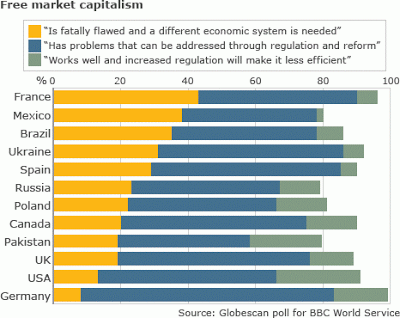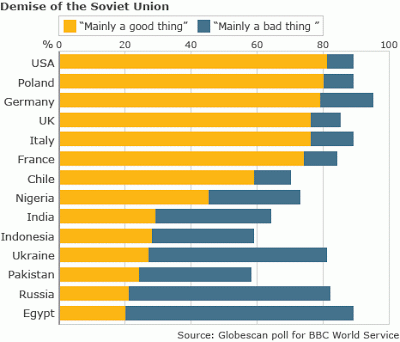
Global survey on free market capitalism:
Majority say fix it or ditch it
By James Robbins / November 9, 2009
Twenty years after the fall of the Berlin Wall, a new BBC poll has found widespread dissatisfaction with free-market capitalism.
In the global poll for the BBC World Service, only 11% of those questioned across 27 countries said that it was working well. Most thought regulation and reform of the capitalist system were necessary.
There were also sharp divisions around the world on whether the end of the Soviet Union was a good thing.
Economic regulation
In 1989, as the Berlin Wall fell, it was a victory for ordinary people across Eastern and Central Europe. It also looked at the time like a crushing victory for free-market capitalism.
Twenty years on, this new global poll suggests confidence in free markets has taken heavy blows from the past 12 months of financial and economic crisis. More than 29,000 people in 27 countries were questioned. In only two countries, the United States and Pakistan, did more than one in five people feel that capitalism works well as it stands.
Almost a quarter — 23% of those who responded — feel it is fatally flawed. That is the view of 43% in France, 38% in Mexico and 35% in Brazil. And there is very strong support around the world for governments to distribute wealth more evenly. That is backed by majorities in 22 of the 27 countries.
If there is one issue where a global consensus seems to emerge from the survey it is this: there are majorities almost everywhere wanting government to be more active in regulating business. It is only in Turkey that a majority want less government regulation.
Opinion about the disintegration of the Soviet Union is sharply divided.

Europeans overwhelmingly say it was a good thing: 79% in Germany, 76% in Britain and 74% in France feel that way. But outside the developed West it is a different picture. Almost seven in 10 Egyptians say the end of the Soviet Union was a bad thing and views are sharply divided in India, Kenya and Indonesia.
Source / BBC News
Thanks to Common Dreams / The Rag Blog


















Of course!
Explain to me how capitalism and “God” became synonymous?
I mean, Jesus Christ was born in a slave society, which is what the entire Roman Empire was economically. Then Chirstendom was a fuedal (sharecropping) economic system. Then capitalism arrived around the time of Martin Luther of Germany.
So what is so freaking “timeless” and “holy” about capitalism, by the definition of this very seemingly religious righ wing?
Nothing, Its just an economic arrangement, and if it doesn’t work, if its not productive, then ditch it! Just like in the past when other unproductive and brutal economic systems were ditched for something better.
It’s time to face the fact that Cowboy capitalism is failing — and badly. The best educational systems; the best health care systems; and the most people-friendly control of food, pharmaceuticals, and the environment can be found in those countries that are not afraid of the word “socialism.”
Jesus Christ was not really born into a Slave society, in fact he was never born at all, he is an imaginary figure in a story by King James and Francis Bacon, like the Easter bunny or the Great pumpkin. Cap’n Ahab didn’t really exist, but as a sailor I can see why we wanted to create him.
Furtherboat has it 100% correct in my opinion………..
notice how Richard said we need to get rid of people that dont think we need to have the taxpayers fund abortion? Seems to me that if you dont agree with the statists they want you completely out of the way. Not open for discussion! Abortion right or wrong should not have to be funded by people who dont believe in it! They are entitled to their opinion just like the other side is! Why is it always their way or the highway. I dont want to fund it but I dont want to stop it either. Live and let live instead of controlling every single aspect of our lives!
Anon,
I think you commented on the wrong post. I’m sorry you thought that I meant to get rid of people, I admit I wasn’t to clear. It is not people we need to get red of but the system of phony representative democracy and the economic system where people have to pay for health care.
The wrinkly in the polling data is that there’s a regulatory line that, if you cross it, hard core capitalists would say you no longer have capitalism.
If I answered the polling question, I would be in the group for more regulation, but whether the result is more like capitalism or more like socialism is absolutely a judgment call, and that judgment call gets turned into an epithet by both capitalists and socialists when arguing about specific policies.
We are ruled by the Cold War from its grave.
What was defeated was not socialism and what “won” was not capitalism.
It would be good to learn to discuss policy outside that paradigm.